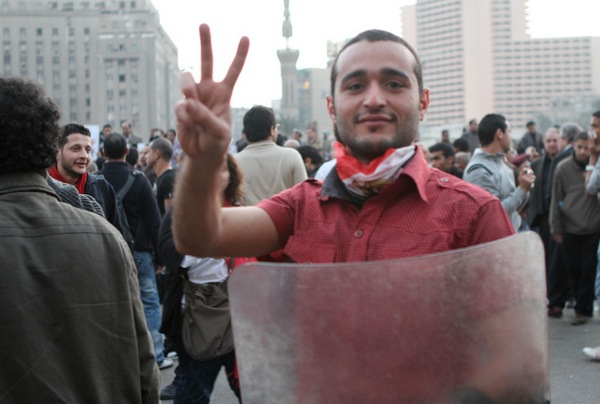Perhaps more worrying than Egypt’s uprising itself is the lack of any definitive leader behind it. Ayman Nour, the prominent Egyptian opposition politician and head of the El Ghad party, was reportedly injured in Friday’s protests. But that neither slowed nor fueled the demonstrations. However amid the flames and smoke, another figure may be emerging.
Mohammad ElBaradei, the former IAEA official-turned-presidential hopeful, returned to Egypt on Thursday. The following day he joined an unprecedented fourth day of demonstrations. The Nobel laureate is considered a leading pro-democracy advocate. He has called for reforms in Egypt and has urged for an end to President Hosni Mubarak’s 30-year “emergency decree” rule.
One has to wonder if Israel and the US split ElBaradei’s airfare. Both countries are closely watching developments in the Northern African nation, for both countries – rightly so – fear a repeat of Tehran circa 1979. It was then that droves of young demonstrators took to the streets of a large Muslim nation and ousted its long-ruling Western-backed leader. The power vacuum that followed paved the way for Islamists. More than 30 years later, those same usurpers of power still maintain a strong grip on the Iranian State. In Egypt, wide support for the outlawed Muslim Brotherhood could yield a similar result, and ElBaradei may be the West’s only hope of ensuring that does not happen.
Ironically, Egyptian officials are now helping. Images of ElBaradei caught amid the tear gas following Friday’s prayers turns him into a victim. By midday, police placed him under house arrest for his involvement in the protests, a move which further elevates his status. Perhaps he did not emerge from Robin Island prison like South Africa’s Nelson Mandela, but authorities in Egypt sure seem bent on turning him into such a figure.
The situation in Egypt is rapidly shifting. Military tanks rolled through the streets of Cairo late on Friday. Police surrendered a major square in the city to the protesters. The headquarters of the ruling National Democratic Party (NDP) were engulfed in flames. And in Alexandria, demonstrators gained control of some government buildings as police fled. President Mubarak extended the application of a curfew from the capital to all cities around the country, but protesters appeared committed to its defiance. Late Friday night, Mubarak broke his silence and addressed the nation is a television speech that lacked any luster and failed to quell the demonstrations.
The White House has also remained ambiguous. Does it prop-up a dictator who happens to be a close Washington ally? Or does it support democracy and a popular uprising which could pave the way for a tectonic shift in regional stability? Egypt is the US’s third biggest receipt of aid. It is also Washington’s most reliable Arab friend vis-à-vis military and energy strategy. US President Barack Obama is being forced to walk a tightrope, and every minute the rope is getting tighter and tighter.
US Secretary of State Hillary Clinton has called for dialogue between the protestors and Mubarak. But in truth, it is not clear if Washington wants him to stay or go. Enter “Nelson ElBaradei,” the White House’s answer should Mubarak flee. Things are not looking good and he may soon consider packing. Perhaps Zine el Abidine Ben Ali in Saudi Arabia needs a roommate.

